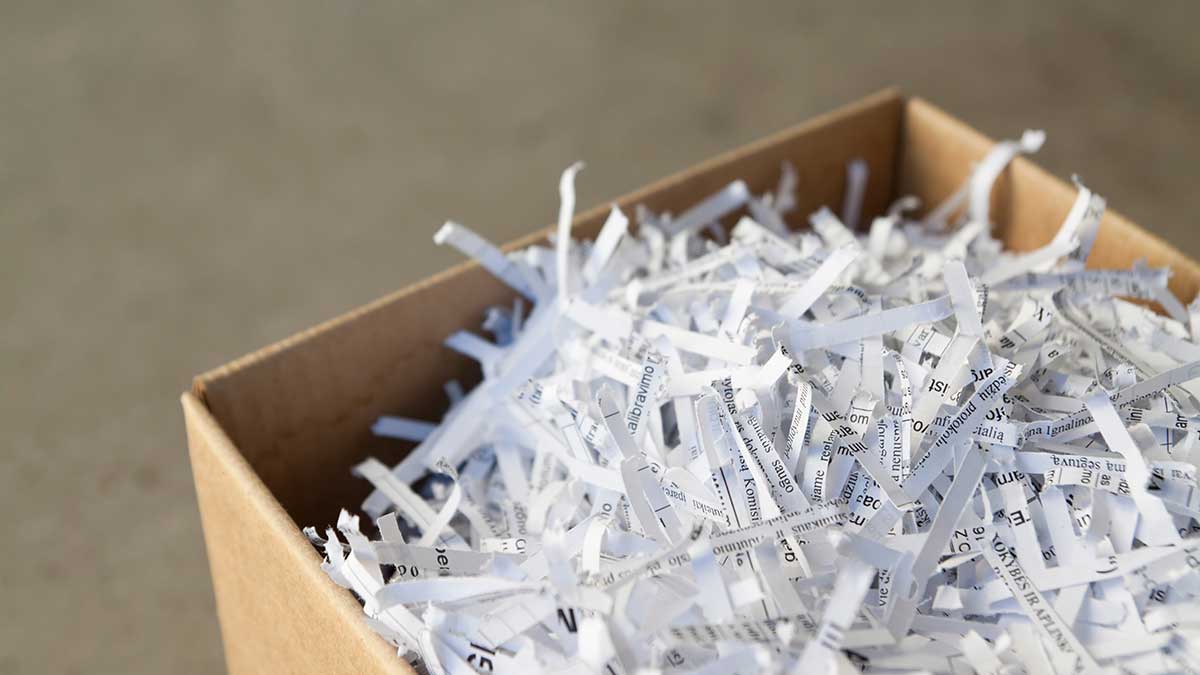 One of the best ways to avoid identity theft is to shred documents with personal information, such as bills and receipts. But don’t shred for no reason, because this significantly reduces the paper’s recycling market.
One of the best ways to avoid identity theft is to shred documents with personal information, such as bills and receipts. But don’t shred for no reason, because this significantly reduces the paper’s recycling market.
It might seem like shredded paper would be as easy to recycle as office paper or newsprint (rememember that?), but the reality is much more complicated. Most recycling programs do not accept shredded paper in the recycling bin because staples and other contaminants can be mixed in with shredded paper.
Shredding also makes the resulting recycled paper less durable and useful, since the fibers in shredded paper are typically shorter than other paper or different grades of paper, some coated, get mixed in. Finally, the small bits of paper can fly all over in the sorting process and threaten to jam machinery, which frequently leads to worker injuries.
Americans consume about 700 lbs. of paper annually, and we only recover 67.9 percent of it for recycling, as of 2022. Paper accounts four about 26% of landfill waste and is a prominent source of methane emissions as it breaks down.
Nevertheless, shredding is a prevalent practice, particularly in business. Protecting personal information in important in an era when any information can be used to take control of personal or business online accounts. There is no law against searching through your garbage for personal information, but thieves are unlikely to try and piece together shredded paper in your recycling bin.
The best option is to reduce the use of paper, which is easier in the digital era. If you must use paper and feel it needs to be shredded, take the steps necessary to recycle it. First, find out what your regional recycling programs offer. Find drop-off spots for shredded paper by adding your ZIP Code to this Earth911 Recycling Search.
Shredded Paper Recycling Preparation
- If you are shredding paper at home, make sure to read the manual and operate with safety.
- When you’re ready to empty the shredder, most recycling programs will ask that you put shredded paper in a larger container, such as a paper or plastic bag. You’ll want to check locally for your city’s instructions.
- If you are partnering with a commercial shredding company (such as for your business), make sure to ask for a certificate of destruction once the recycling is complete.
Shredded Paper Recycling Process
Shredded paper is classified as mixed paper, so the first step in recycling is to separate it from cardboard, office paper and newspaper grades. Shredded paper is then baled and sent to a mill.
At the mill, there are machines called pulpers that introduce water and chemicals to break down the paper into fibers. Then, any ink and adhesive is removed and the paper fibers start bonding together. Finally, the fibers are rolled and dried, then sent off to make new products. Because mixed-paper fibers are smaller than cardboard or office paper, this paper is recycled into lesser-quality paper products, such as coffee filters, egg cartons and paper towels.
Find Recycling Guides for Other Materials
Frequent Shredded Paper Recycling Questions
Can I recycle shredded paper in my curbside recycling program?
It depends on where you live. Shredded paper is one of the biggest material acceptance variables in curbside recycling, so you should check with your local curbside program before placing it in the recycle bin. Almost every city that accepts shredded paper will require that you bag it first.
Is there an alternative to shredding my paper?
In most cases, the information you’re looking to delete is only on one line, such as a name or number. You can use a permanent marker to remove the personal information without shredding the document. This ink is easily removed in the recycling process.
Why is it difficult to recycle shredded paper?
In paper recycling, the longer the fibers, the higher the value of the paper. For shredded paper, the fiber lengths are purposefully shortened, thereby reducing the recycling market.
Can I compost shredded paper?
Yes. Shredded paper is great for home-based compost programs because it’s already largely broken down and paper is a key ingredient in compost. You’ll want to check before trying to include it with your yard waste collection, though.
Are there any states that require shredded paper recycling?
Currently, 32 states have laws requiring the destruction of documents containing personal information. However, this mostly applies to businesses and governments, and doesn’t require recycling of the shredded paper. If you’re going to pay for a company to shred files, though, you might as well find one that will recycle them.
Additional Reading
- Don’t Recycle Your Identity: Paper is one area where proper disposal could prevent identity theft
- Everything You Need to Know About Paper Recycling: Shredded paper is just one type of paper product that you can help keep out of landfills
- When Is Composting Better Than Recycling?: For shredded paper, compost is the environmentally preferred disposal method
Editor’s Note: This article was originally published on June 7, 2016, and most recently updated in September 2024.
